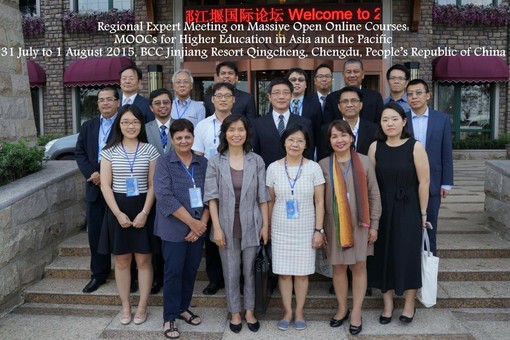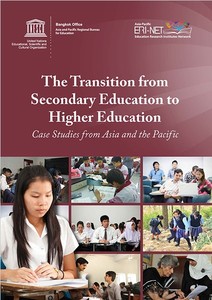Regional Expert Meeting on Massive Open Online Courses: MOOCs for Higher Education in Asia and the Pacific, Chengdu, People’s Republic of China
UNESCO Bangkok, in collaboration with the National Commission of the People’s Republic of China for UNESCO, organized the Regional Expert Meeting on Massive Open Online Courses: MOOCs for Higher Education in Asia and the Pacific. Held from 31 July to 1 August 2015 in Chengdu, the meeting was intended to support the commitments and recommendations made at the World Education Forum 2015 in Incheon and the International Conference on ICT and post-2015 Education in Qingdao.
A group of twenty-one representatives from higher education institutions in nine countries participated in the meeting, who are experts in online learning, Open and Distance Learning (ODL) and MOOCs. The meeting was held in parallel with the Dujiangyan International Forum organized by the Chinese National Commission for UNESCO.
Setting the stage for the meeting were global and regional overviews on MOOCs, followed by case study presentations and forum discussions, where the participants shared how MOOCs are being used for higher education in their respective universities, systems, or countries. The participants presented the MOOCs cases focusing on best policies and practices, benefits and opportunities, challenges and pitfalls.
For expert meeting participant Dr. Fay Patel, Director of Education Management at University of Monash Malaysia, the meeting was “a critical catalyst in highlighting the various collaborative models in online, ODL and MOOCs development in the Asia-Pacific region and encouraged the regional stakeholders to identify common ground for future engagement.”
In order to identify the next course of action, the participants engaged in a synthesis of the meeting sessions and a planning workshop, one outcome of which is a a working group which will jumpstart the regional network of MOOCs for higher education. The same working group agreed to work on a UNESCO Bangkok publication on the MOOCs cases presented at the meeting, with each member committing to contribute a chapter to the proposed publication. Future directions for regional cooperation were also discussed, to include a follow-up meeting in 2016.
Resources
Programme (250 kb)
Concept Note (150 kb)
Presentations
Keynote Speeches:
◊ Online Education, ODL and MOOCs – A Global Perspective (Robert Rhoads, Director of Globalization and Higher Education Research Center, Graduate School of Education and Information Studies, University of California, Los Angeles (UCLA)) - pdf, 860kb
◊ Online Learning, ODL and MOOCs - Regional Perspective (Dr. Feiziya Ahmed Patel, Director: Education Management, Monash University Malaysia) - pdf, 1.2mb
Session 1: Forum on Best Policies and Practices (Country / System Cases)
Dr. Young Wha Kee, President, National Institute for Lifelong Education, Republic of Korea; Mr. Hyoung-Shik Park, Deputy Director, University Finance Division, Ministry of Education, Republic of Korea: K-MOOC: How Learning Can Be Shared
Prof. Datuk Dr. Shahrin Bin Sahib, Vice Chancellor, Universiti Teknikal Malaysia Melaka, Malaysia; Prof. Dr. Hanafi bin Atan, Deputy Director, The Centre for Development of Academic Excellence, Universiti Sains Malaysia – Malaysia MOOCs: Policies and Practices (Presentation 1, Presentation 2)
Prof. Tetsuya Mizumoto, Vice President for Education, Tokyo Institute of Technology; Prof. Hideki Mori, Associate Professor, Tokyo Institute of Technology – Tokyo Tech MOOCs: Toward World Class Education
Session 2: Forum on Benefits and Opportunities of MOOCs for Higher Education
Prof. Ricky Kwok, Associate Vice-President (Teaching and Learning), The University of Hong Kong, Hong Kong SAR, China – Fostering Collaborations via MOOCs
Dr. Solasa Sataporn, Chairperson, Bachelor of Arts in English Programme, Sukhothai Thammatirat Open University (STOU), Thailand – Benefits and Opportunities of MOOCs for Higher Education: The Case of STOU
Prof. Daryono, Dean, Faculty of Social and Political Science, Universitas Terbuka, Indonesia - Benefits and Opportunities of MOOCs for Higher Education: The Case of Universitas Terbuka
Session 3: Forum on Challenges and Pitfalls of MOOCs for Higher Education
Dr. Melinda dela Pena-Bandalaria, Dean and Professor, Faculty of Information and Communication Studies, University of the Philippines Open University, Philippines - The Challenges and Pitfalls of MOOCs for Higher Education (PMOOC: MODeL)
Prof. Jianhua Zhao, Deputy Dean, South China Normal University, People’s Republic of China - An Overview of MOOCs in China: Policies, Advantages, & Challenges
Prof. Yasushi Kodama, Professor, Faculty of Business Administration, Hosei University; Chairperson, International Collaboration Working Group, JMOOC, Japan - JMOOC: MOOC from Japan, Our Challenges and Perspectives
Session 4: Planning Workshop on Strategies on MOOCs for Higher Education
- Quality Assurance
- Accreditation and Certification
- Learner Support
- Community of Practitioners and Learners
- Creating a Regional MOOCs Network






















